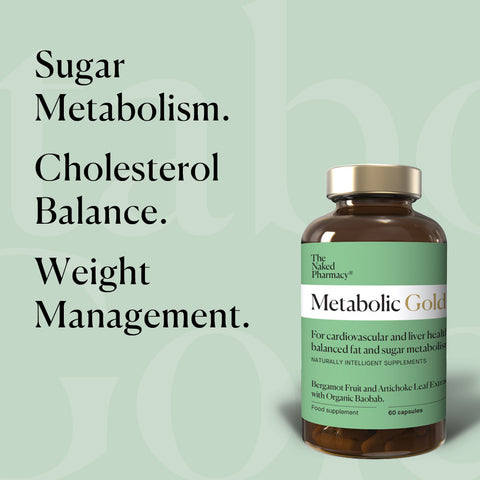Research | Bergamot
At The Naked Pharmacy, we ensure that all of our supplements are made with effective strength bioactives, so they are clinically proven to work.
We aim for each supplement to be scientifically supported by multiple randomised placebo-controlled studies. All clinical trial studies we use to support our supplements are undertaken on human patients, using the exact same dosage and formulation of the product. The scientific studies are published in peer review journals.
What can Bergamot do for you?
Research is now showing that the four specific polyphenols in high strength organic bergamot fruit extract provide effective support for managing weight and cholesterol, by binding to bad fats in the gut.
Naringin, Neohesperidin, Melitidine and Bruteridin are the primary bioactives in bergamot. We know they’re most effective at a concentration of 35% so that’s what you’ll find in our Metabolic Gold supplement.
Research has shown that these bioactives directly block cholesterol production. They also influence the enzymes in the liver when processing fats, without causing interactions with conventional medications. Studies have shown that using Bergamot extract alongside a statin enables the statins to be effective at lower doses.If you’d like for more information on the available evidence which details and supports the efficacy of bergamot, follow the links below.
The Studies
The scientific studies to support our claims on bergamot are published in the following peer review journals:
Study: Bergamot polyphenolic fraction enhances rosuvastatin-induced effect on LDL-cholesterol, LOX-1 expression and protein kinase B phosphorylation in patients with hyperlipidemia by Gliozzi M et al, 2013 RCT Randomised placebo controlled 77 Human participants. The aim of this study was to investigate the occurrence of an enhanced effect of bergamot-derived polyphenolic fraction (BPF) on rosuvastatin-induced hypolipidemic and vasoprotective response in patients with mixed hyperlipidemia.
The authors concluded that the addition of BPF to rosuvastatin significantly enhanced the effect of rosuvastatin on serum lipemic profile, compared to rosuvastatin alone. This lipid-lowering effect was associated with significant reductions of biomarkers used for detecting oxidative vascular damage, suggesting a multi-action enhanced potential for BPF in patients on statin therapy.
Study: Bergamot Reduces Plasma Lipids, Atherogenic Small Dense LDL, and Subclinical Atherosclerosis in Subjects with Moderate Hypercholesterolemia: 6 Months Prospective Study by Peter P. Toth et al, 2016 RCT Randomised placebo controlled 80 Human participants.
The aim of this study was to fully investigate the effects of a Bergamot extract on cardio-metabolic parameters, including plasma lipids, atherogenic lipoproteins and subclinical atherosclerosis. The authors concluded that bergamot fruit extract supplementation significantly reduced plasma lipids and improved the lipoprotein profile. Carotid intima-media thickness (cIMT) was also reduced significantly over a relatively short time frame of 6 months.
Study: Hypoglycemic and Hypolipemic effects of a New Lecithin Formulation of Bergamot Polyphenolic Fraction: A Double Blind Randomised, PLacebo Controlled Study by V. MOLLACE ET AL, 2018 Randomised, double blind, placebo-controlled trial 60 human participants.
The aim of this study was to investigate the effect of standard bergamot polyphenolic fraction (BPF®) as well as of its phytosomal formulation (BPF Phyto), in patients with type 2 DM and hyperlipemia.
Conclusions
In the groups receiving BPF and BPF Phyto, a significant reduction of fasting plasma glucose, serum LDL cholesterol and triglycerides accompanied by increased HDL cholesterol was observed. This effect was associated with significant reduction of small dense atherogenic LDL particles, as detected by means of proton NMR Spectroscopy, thus confirming the hypolipemic and hypoglycemic effect of bergamot extract both when using standard formulation as well as BPF Phyto.
Study: The Effect of Bergamot derived Polyphenolic Fraction on LDL Small Dense Particles and Non Alcoholic Fatty Liver Disease in Patients with Metabolic syndrome. Micaela Gliozzi, Cristina Carresi, Vincenzo Musolino, Ernesto Palma, Carolina Muscoli, Cristiana Vitale, Santo Gratteri, Giuseppe Muscianisi, Elzbieta Janda, Saverio Muscoli, Francesco Romeo, Salvatore Ragusa, Rocco Mollace, Ross Walker, James Ehrlich, Vincenzo Mollace*Randomised, placebo controlled 107 human participants
Results
In this study, the group receiving BPF 650 mg twice a day showed a significant reduction of fasting plasma glucose, serum LDL cholesterol and triglycerides alongside with an increase of HDL cholesterol. This effect was accompanied by significant reduction of both ultrasonographic and metabolic biomarkers of NAFLD. Moreover, a significant reduction of small dense LDL particles, as detected via proton NMR Spectroscopy, was found.
Study: THE EFFECT OF BERGAMOT ON PLASMA LIPIDS, LIPOPROTEINS AND CAROTID INTIMA MEDIA THICKNESS. The results of this clinical trial have not been published yet, however the high sample size (160 participants) is particularly interesting.
Abstract
The research hypothesis is to assess whether bergamot reduces plasma lipids (total cholesterol, triglycerides, low density lipoprotein (LDL) cholesterol and high density lipoprotein (HDL) cholesterol), atherogenic lipoproteins, carotid intima media thickness (IMT) and liver steatosis in patients with dyslipidemia.







